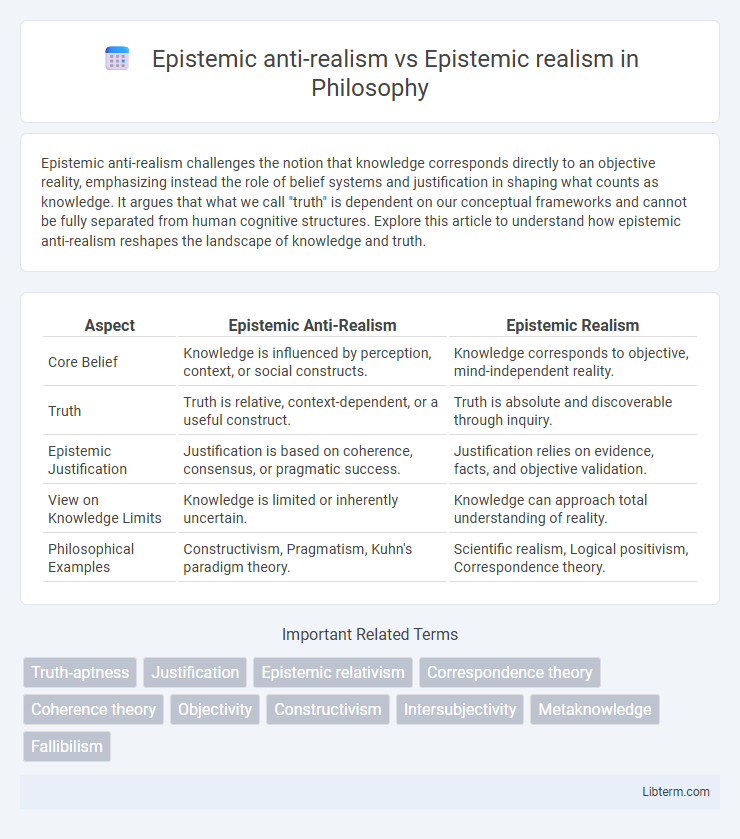Epistemic anti-realism challenges the notion that knowledge corresponds directly to an objective reality, emphasizing instead the role of belief systems and justification in shaping what counts as knowledge. It argues that what we call "truth" is dependent on our conceptual frameworks and cannot be fully separated from human cognitive structures. Explore this article to understand how epistemic anti-realism reshapes the landscape of knowledge and truth.
Table of Comparison
| Aspect | Epistemic Anti-Realism | Epistemic Realism |
|---|---|---|
| Core Belief | Knowledge is influenced by perception, context, or social constructs. | Knowledge corresponds to objective, mind-independent reality. |
| Truth | Truth is relative, context-dependent, or a useful construct. | Truth is absolute and discoverable through inquiry. |
| Epistemic Justification | Justification is based on coherence, consensus, or pragmatic success. | Justification relies on evidence, facts, and objective validation. |
| View on Knowledge Limits | Knowledge is limited or inherently uncertain. | Knowledge can approach total understanding of reality. |
| Philosophical Examples | Constructivism, Pragmatism, Kuhn's paradigm theory. | Scientific realism, Logical positivism, Correspondence theory. |
Understanding Epistemic Realism
Epistemic realism asserts that knowledge corresponds to objective reality, maintaining that beliefs and theories can accurately represent the world as it is. Unlike epistemic anti-realism, which doubts the possibility of attaining objective knowledge, epistemic realism emphasizes the alignment between epistemic justification and truth. This position underpins scientific inquiry by affirming that verification and empirical evidence lead to genuine understanding rather than mere useful frameworks.
Defining Epistemic Anti-Realism
Epistemic anti-realism holds that the truth of knowledge claims depends on our cognitive frameworks and evidence, denying an independent, mind-independent reality that knowledge must correspond to. This position contrasts with epistemic realism, which asserts that there is a fact of the matter about truth independent of our beliefs or conceptual schemes. Epistemic anti-realism emphasizes the role of justification, verification, and the limits of human inquiry in determining what can be known.
Historical Context of the Debate
The debate between epistemic anti-realism and epistemic realism traces back to early modern philosophy, notably during the Enlightenment when thinkers like Descartes emphasized certainty in knowledge, laying groundwork for realism. In the 20th century, philosophers such as Hilary Putnam and Bas van Fraassen challenged traditional epistemic realism by advocating anti-realist positions focused on the constructive role of human cognition and empirical adequacy. This historical context highlights a shift from a belief in objective, mind-independent truths to acknowledging knowledge as potentially theory-laden and context-dependent.
Core Principles of Epistemic Realism
Epistemic realism asserts that knowledge and truth exist independently of our beliefs or cognitive access, emphasizing that facts about the world remain objective regardless of human perception. Core principles include the existence of mind-independent truths, the notion that epistemic justification aims to accurately represent these truths, and the belief that knowledge progress leads closer to objective reality. This stance contrasts with epistemic anti-realism, which challenges the objectivity or knowability of such truths.
Key Arguments for Epistemic Anti-Realism
Epistemic anti-realism challenges the notion that knowledge corresponds to an objective reality independent of our cognitive frameworks, arguing that what we claim as knowledge is shaped by social, linguistic, and historical contexts. Key arguments emphasize the fallibility of human perception, the theory-ladenness of observation, and the underdetermination of theories by evidence, suggesting that certainty about reality's independent existence is unattainable. This position questions the possibility of absolute epistemic justification, advocating for a more pragmatic understanding of knowledge as contingent and situated.
Major Philosophers and Their Positions
Epistemic anti-realism, championed by philosophers like Bas van Fraassen and Michael Dummett, argues that knowledge is tied to our verification capabilities and denies that truth is independent of our epistemic access. Epistemic realism, supported by figures such as Hilary Putnam and Alvin Goldman, maintains that knowledge aims to describe an objective reality independent of human cognition or verification. The debate centers on whether knowledge reflects mind-independent truths (realism) or is constructed through our epistemic frameworks and practices (anti-realism).
Ontological Commitments in Epistemology
Epistemic anti-realism denies ontological commitments to the existence of mind-independent truths, asserting that knowledge claims depend on human cognitive frameworks and conceptual schemes. Epistemic realism, by contrast, posits that epistemological justification aims to track objective reality, committing ontologically to the existence of facts and truths independent of our beliefs or linguistic practices. The debate centers on whether epistemic concepts correspond to mind-independent entities or are constructed within subjective or intersubjective contexts.
Implications for Knowledge and Truth
Epistemic anti-realism asserts that knowledge and truth are dependent on human cognitive frameworks, implying that what we consider true is always relative to our conceptual schemes and evidence. Epistemic realism maintains that knowledge corresponds to objective truths that exist independently of our beliefs or cognitive capacities. These contrasting views influence the criteria for justification and the possibility of attaining absolute truth, shaping debates on the limits of human understanding and the nature of knowledge itself.
Criticisms and Counterarguments
Epistemic anti-realism faces criticism for potentially undermining objective knowledge by suggesting that truth is dependent on social constructions or cognitive frameworks, which critics argue leads to relativism and skepticism. Epistemic realism counters that knowledge corresponds to mind-independent truths, yet it struggles with challenges related to the theory-ladenness of observation and the fallibility of human cognition. Both positions grapple with the problem of justifying knowledge claims, where anti-realists emphasize the role of epistemic practices, and realists defend the existence of objective epistemic standards despite empirical and philosophical uncertainties.
Future Directions in Epistemic Theory
Future directions in epistemic theory emphasize refining the debate between epistemic anti-realism and epistemic realism by integrating cognitive science insights and probabilistic reasoning frameworks. Advances in artificial intelligence and machine learning offer new methodologies to model belief formation and justification processes, potentially bridging gaps between the two positions. Empirical studies on human epistemic practices and the evolving nature of knowledge acquisition continue to challenge traditional assumptions, encouraging a dynamic re-evaluation of epistemic norms.
Epistemic anti-realism Infographic

 libterm.com
libterm.com